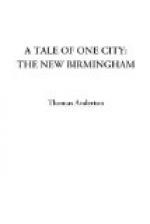Two other brothers, Mr. Herbert and Mr. Walter Chamberlain, have at times been induced to take a little hand in public work, but their efforts have been of a mild, modest, innocent character. Now, however, they have retired into that privacy from which they so timidly emerged. For many reasons Mr. Chamberlain’s brothers were, perhaps, wise not to bid high for public place and position in Birmingham. People are apt to be needlessly suspicious of too much family influence in public concerns. There is always a tendency and a readiness to inveigh against cliques, especially family cliques. And at one time there was certainly a disposition in some quarters to keep a jealous eye upon Joseph and his brethren, lest they should acquire an undue amount of influence and power. One blunt, outspoken Scotchman, I remember, expressed this feeling in his own characteristic way by saying, “If we don’t mind we shall be having too much dom’d Chamberlain.”
The Chamberlain family, however, being more or less smart, spry men, were doubtless sharp enough to detect some inkling of this sort of feeling, and consequently they thought it better to silence any such cavillings by eschewing as far as they could public life, and contenting themselves with being brothers of a big man and sharing a little reflected glory.
Whilst mentioning Mr. Chamberlain’s family I must say a word of his brother-in-law, Mr. William Kenrick, for some years M.P. for the Northern Division of Birmingham. Mr. Kenrick was Mayor of Birmingham in 1877, and a worthy and modest chief magistrate he made. A generous, intelligent, public-spirited man, he has always been liberal with his purse and his time, and has done much to further educational and philanthropic schemes. Mr. Kenrick belongs to a class some cynical people consider very “cliquey.” It is, however, to be wished there were more such “cliquey” people in our midst, for they are always conspicuously at the fore in supporting by their influence and their money every good cause which has for its object the alleviation of suffering and the improvement of the people.
It is true that there was one important project inaugurated some few years ago that did not enlist their sympathy. This was the Birmingham Bishopric Scheme. But, seeing that most of the “clique” are Unitarians, they could hardly be expected to support a proposal for the benefit of the Established Church. It was a misfortune for that Church that the Chamberlain party and their friends were aliens in religious matters. Had it been otherwise the results of the proposed scheme might have been very different. The “clique,” when they do support a cause, do it with no niggardly hand, and if it had so chanced that they had been Churchmen instead of Unitarians, the probabilities are that by this time Birmingham would have been in possession of a full-sized Bishop all its own, and possibly a fine, bran-new, costly cathedral to boot.




